One of the most important machines in the farmyard during the winter is the tractor and front loader due to the fact it is working every day feeding animals as well as carrying out other tasks around the yard and farm. Below is a guide on things you should do in order to get this vital machine in tip-top shape for the winter.

Lighting: Make sure all the lights are in place and functioning correctly. This includes headlights, work lights, brake lights and indicators. This is important for safety all year round but even more so during the winter to aid visibility with the reduced daylight hours.

Windows and mirrors: All the tractor’s windows should be in place and kept clean of dirt in order to both protect the driver from the elements as well as aiding visibility. A dirty window can seriously impede your ability to see, which is a safety concern. The same principle applies to the mirrors, which should be in place, fixed solid and kept clean. Broken or cracked mirrors should be replaced. The window wipers should also be checked to ensure they are working and the wiper blade replaced if necessary. Make sure the washer system is also working and is filled with an anti-freeze solution to help defrost frozen windows faster in the mornings.

Tyres: Special attention should be given to the tractor’s tyres ahead of the winter due to the fact that snow and ice will cause it to slip and slide, especially with worn tyres. Handling bales also puts increased pressure on the tractor’s front tyres, which can cause a blow-out if they are not maintained correctly.
Check over the tyres, paying close attention to cracks, cuts or flaws which may reduce the tyre’s structural strength as well as checking the grip level. Worn or damaged tyres must be replaced.
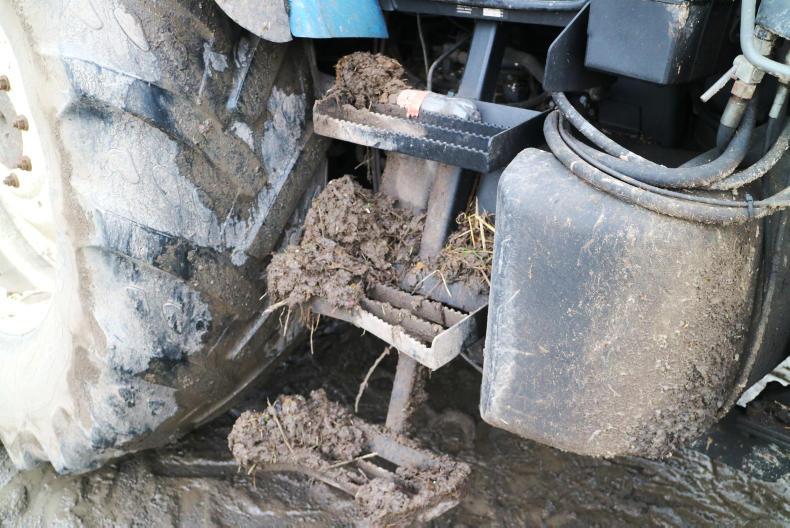
Steps: The tractor’s steps should be kept clear of debris which may cause the operator to slip getting in or out of the vehicle. The steps should also be securely mounted and maintained and if necessary repaired or replaced.

Hitch and linkage: The tractor’s pickup hitch and rear linkage must be checked for signs of wear and tear as well as potential problems such as cracks or loose bolts, which may lead to bigger issues in the future. It is vitally important that these components are maintained correctly due to the fact they are often the only point connecting the tractor to the load or implement which it is operating.
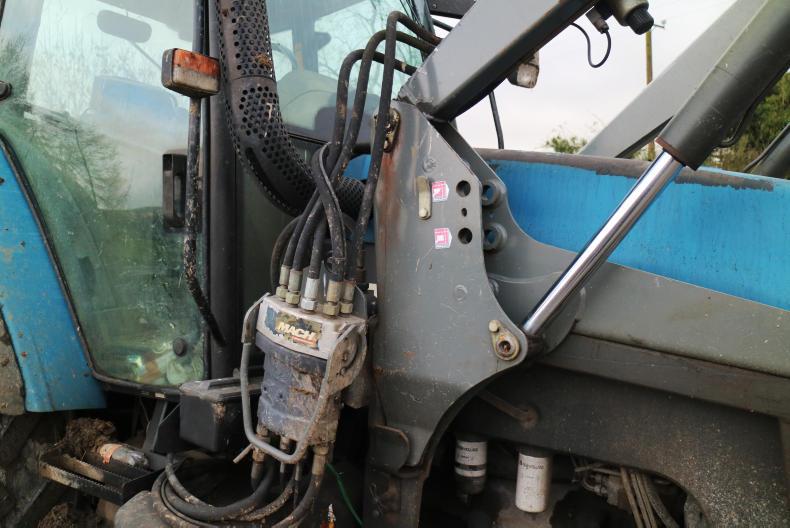
Loader brackets: The loader’s brackets, which connect the tractor and loader, should be checked for signs of wear and cracks which may lead to bigger problems during the winter. Also check the bolts which attach the brackets to the tractor for tightness and if necessary torque them to the manufacturer’s specification.
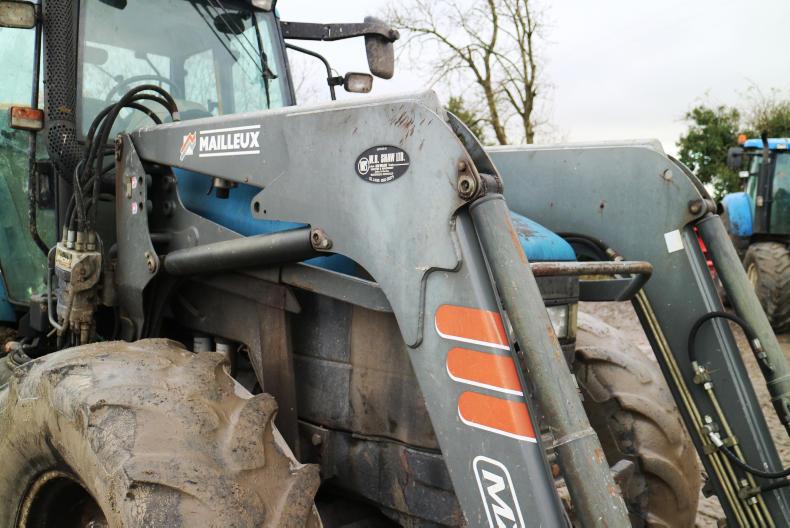
Front loader: Check over the front loader, paying attention to the hinge points for signs of wear, making sure that all grease points are working. Check all bushings and replace worn or damaged ones. Check the hydraulic cylinder, hoses and fittings for signs of leaks.
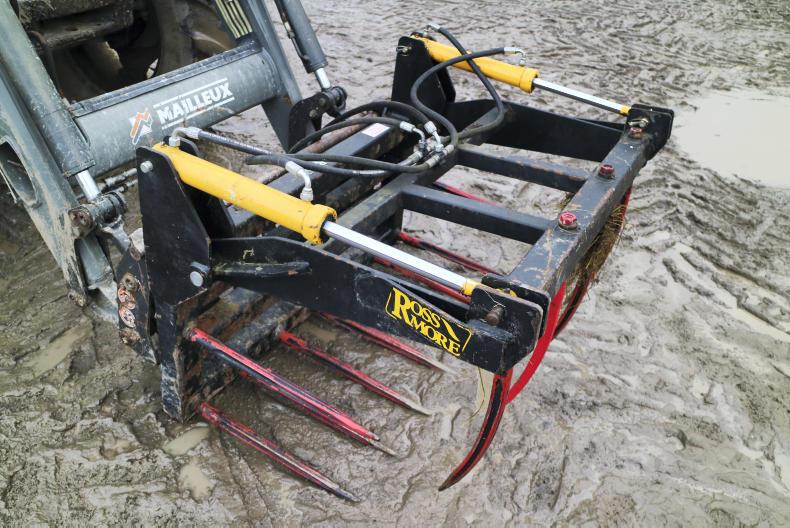
Grab and headstock: Check the loader’s headstock, making sure the locking mechanism that holds the grab in place is working correctly. Check that the grab’s hinge points are greased and working and that there are no signs of wear. Also make sure that all the tines are in place, not bent and tight. If using a shear grab, make sure it is kept sharp as this will reduce the stress on the rest of the grab and loader as well as cutting the silage pit face faster and sealing it better.

Steering and brakes: Make sure that the tractor’s steering is working correctly and that there are no signs of wear at the front hubs. It is important that the steering is maintained correctly, especially during the winter when driving in slippery conditions.
Also make sure the brakes and handbrake are working correctly and balanced. The foot brakes should always be kept interlocked and only unlocked for field work.
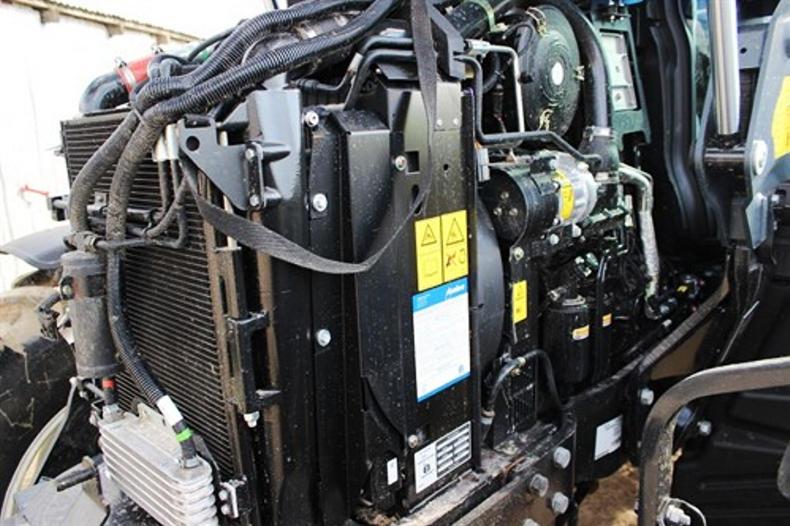
Service: It is good practice to check the tractor’s fluid levels every morning on level ground before starting. These fluids include diesel, engine oil, transmission and hydraulic oils as well as coolant. In cold weather, allow extra time for the engine to heat up to its optimum operating temperature in order to provide adequate lubrication. Failure to do so may result in costly internal damage to the engine.
Modern oils are capable of working in all seasons but it is good practice to check the oil specification and viscosity before the winter and replace if necessary.
Make sure your supplier is giving you a winter grade of diesel, which has a lower freezing point than summer grades. When diesel freezes it turns to a gel-like substance that can block up the fuel lines and prevent the tractor from starting. The fuel system should be serviced and kept clean of contaminants such as dirt and water regularly by draining the water separator where fitted.
If the tractor is fitted with AdBlue, make sure to leave adequate space in the tank in the event of it freezing. AdBlue can freeze and thaw without affecting its ability to function but will expand by up to 7%, potentially cracking the tank.
Check the cooling system is filled with a coolant mix of normally 50:50 and that it has an antifreeze property. Check that the system is topped up to the required level and there are no leaks in the reservoir, radiator and hoses.
Finally, make sure the battery is fully charged. Cold weather doesn’t affect the battery itself but it does require twice as much power in order to start a tractor in the cold.
Make sure your connections on the battery are clean to ensure they are making full connection.
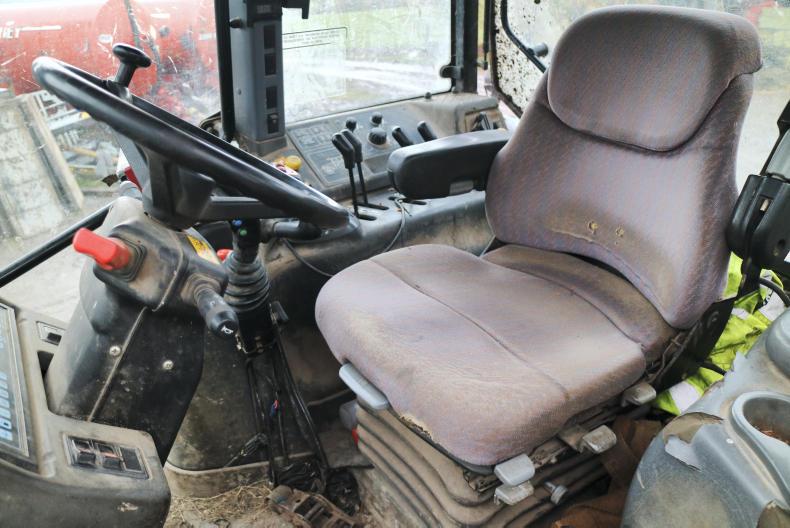
Cab: Keep the tractor clean on the outside as well as inside the cab, making sure there is no unnecessary clutter on the floor where it could roll under the pedals, causing an obstruction. Make sure all the instruments, dials and controls are working and clearly labelled and also that the heaters are working to both keep the driver warm as well as helping to keep the windows clear of frost and condensation.
A little time and money spent checking over your tractor and loader now may save you money and downtime, making you more efficient and safer over this winter feeding season.
Read more
Rainfall warning issued for Munster and Leinster
One of the most important machines in the farmyard during the winter is the tractor and front loader due to the fact it is working every day feeding animals as well as carrying out other tasks around the yard and farm. Below is a guide on things you should do in order to get this vital machine in tip-top shape for the winter.

Lighting: Make sure all the lights are in place and functioning correctly. This includes headlights, work lights, brake lights and indicators. This is important for safety all year round but even more so during the winter to aid visibility with the reduced daylight hours.

Windows and mirrors: All the tractor’s windows should be in place and kept clean of dirt in order to both protect the driver from the elements as well as aiding visibility. A dirty window can seriously impede your ability to see, which is a safety concern. The same principle applies to the mirrors, which should be in place, fixed solid and kept clean. Broken or cracked mirrors should be replaced. The window wipers should also be checked to ensure they are working and the wiper blade replaced if necessary. Make sure the washer system is also working and is filled with an anti-freeze solution to help defrost frozen windows faster in the mornings.

Tyres: Special attention should be given to the tractor’s tyres ahead of the winter due to the fact that snow and ice will cause it to slip and slide, especially with worn tyres. Handling bales also puts increased pressure on the tractor’s front tyres, which can cause a blow-out if they are not maintained correctly.
Check over the tyres, paying close attention to cracks, cuts or flaws which may reduce the tyre’s structural strength as well as checking the grip level. Worn or damaged tyres must be replaced.

Steps: The tractor’s steps should be kept clear of debris which may cause the operator to slip getting in or out of the vehicle. The steps should also be securely mounted and maintained and if necessary repaired or replaced.

Hitch and linkage: The tractor’s pickup hitch and rear linkage must be checked for signs of wear and tear as well as potential problems such as cracks or loose bolts, which may lead to bigger issues in the future. It is vitally important that these components are maintained correctly due to the fact they are often the only point connecting the tractor to the load or implement which it is operating.

Loader brackets: The loader’s brackets, which connect the tractor and loader, should be checked for signs of wear and cracks which may lead to bigger problems during the winter. Also check the bolts which attach the brackets to the tractor for tightness and if necessary torque them to the manufacturer’s specification.

Front loader: Check over the front loader, paying attention to the hinge points for signs of wear, making sure that all grease points are working. Check all bushings and replace worn or damaged ones. Check the hydraulic cylinder, hoses and fittings for signs of leaks.

Grab and headstock: Check the loader’s headstock, making sure the locking mechanism that holds the grab in place is working correctly. Check that the grab’s hinge points are greased and working and that there are no signs of wear. Also make sure that all the tines are in place, not bent and tight. If using a shear grab, make sure it is kept sharp as this will reduce the stress on the rest of the grab and loader as well as cutting the silage pit face faster and sealing it better.

Steering and brakes: Make sure that the tractor’s steering is working correctly and that there are no signs of wear at the front hubs. It is important that the steering is maintained correctly, especially during the winter when driving in slippery conditions.
Also make sure the brakes and handbrake are working correctly and balanced. The foot brakes should always be kept interlocked and only unlocked for field work.

Service: It is good practice to check the tractor’s fluid levels every morning on level ground before starting. These fluids include diesel, engine oil, transmission and hydraulic oils as well as coolant. In cold weather, allow extra time for the engine to heat up to its optimum operating temperature in order to provide adequate lubrication. Failure to do so may result in costly internal damage to the engine.
Modern oils are capable of working in all seasons but it is good practice to check the oil specification and viscosity before the winter and replace if necessary.
Make sure your supplier is giving you a winter grade of diesel, which has a lower freezing point than summer grades. When diesel freezes it turns to a gel-like substance that can block up the fuel lines and prevent the tractor from starting. The fuel system should be serviced and kept clean of contaminants such as dirt and water regularly by draining the water separator where fitted.
If the tractor is fitted with AdBlue, make sure to leave adequate space in the tank in the event of it freezing. AdBlue can freeze and thaw without affecting its ability to function but will expand by up to 7%, potentially cracking the tank.
Check the cooling system is filled with a coolant mix of normally 50:50 and that it has an antifreeze property. Check that the system is topped up to the required level and there are no leaks in the reservoir, radiator and hoses.
Finally, make sure the battery is fully charged. Cold weather doesn’t affect the battery itself but it does require twice as much power in order to start a tractor in the cold.
Make sure your connections on the battery are clean to ensure they are making full connection.

Cab: Keep the tractor clean on the outside as well as inside the cab, making sure there is no unnecessary clutter on the floor where it could roll under the pedals, causing an obstruction. Make sure all the instruments, dials and controls are working and clearly labelled and also that the heaters are working to both keep the driver warm as well as helping to keep the windows clear of frost and condensation.
A little time and money spent checking over your tractor and loader now may save you money and downtime, making you more efficient and safer over this winter feeding season.
Read more
Rainfall warning issued for Munster and Leinster












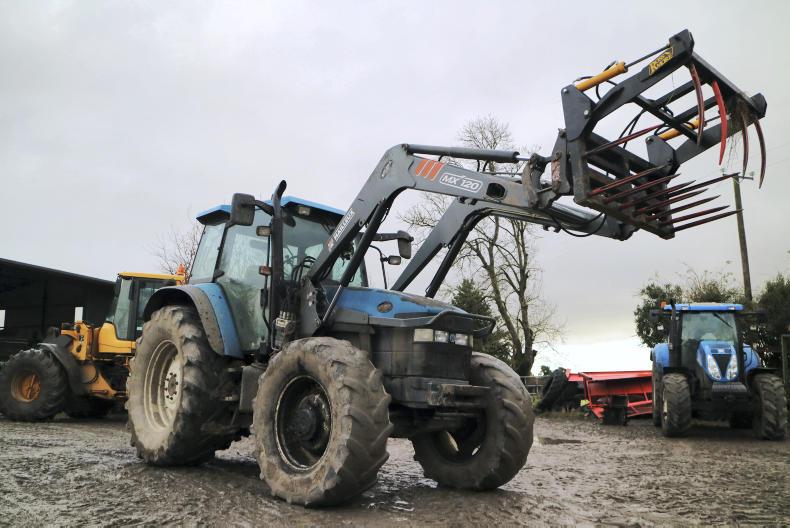




 This is a subscriber-only article
This is a subscriber-only article





















SHARING OPTIONS: